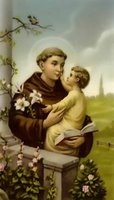Act of Consecration to the Holy Ghost
On my knees before the great multitude of heavenly witnesses, I offer myself soul and body to Thee, Eternal Spirit of God. I adore the brightness of Thy purity, the unerring keenness of Thy justice, and the might of Thy love. Thou art the Strength and Light of my soul. In Thee I live and move and am. I desire never to grieve Thee by unfaithfulness to grace, and I pray with all my heart to be kept from the smallest sin against Thee. Mercifully guard my every thought and grant that I may always watch for Thy light and listen to Thy voice and follow Thy gracious inspirations. I cling to Thee and give myself to Thee and ask Thee by Thy compassion to watch over me in my weakness. Holding the pierced Feet of Jesus and looking at His Five Wounds and trusting in His Precious Blood and adoring His opened Side and stricken Heart, I implore Thee Adorable Spirit, helper of my infirmity, so to keep me in Thy grace that I may never sin against Thee. Give me grace O Holy Ghost, Spirit of the Father and the Son, to say to Thee always and everywhere, Speak Lord, for Thy servant heareth. Amen.
Come Holy Spirit, Creator Blest (Veni, Creator Spiritus)
Come, Holy Spirit, Creator blest,
and in our souls take up Thy rest;
come with Thy grace and heavenly aid
to fill the hearts which Thou hast made.
O comforter, to Thee we cry,
O heavenly gift of God Most High,
O fount of life and fire of love,
and sweet anointing from above.
Thou in Thy sevenfold gifts are known;
Thou, finger of God's hand we own;
Thou, promise of the Father, Thou
Who dost the tongue with power imbue.
Kindle our sense from above,
and make our hearts o'erflow with love;
with patience firm and virtue high
the weakness of our flesh supply.
Far from us drive the foe we dread,
and grant us Thy peace instead;
so shall we not, with Thee for guide,
turn from the path of life aside.
Oh, may Thy grace on us bestow
the Father and the Son to know;
and Thee, through endless times confessed,
of both the eternal Spirit blest.
Now to the Father and the Son,
Who rose from death, be glory given,
with Thou, O Holy Comforter,
henceforth by all in earth and heaven. Amen.
Note: There is an indulgence associated with the above prayer.
Prayer for the Help of the Holy Ghost by Saint Anthony of Padua
O God, send forth your Holy Ghost into my heart that I may perceive, into my mind that I may remember, and into my soul that I may meditate. Inspire me to speak with piety, holiness, tenderness and mercy. Teach, guide and direct my thoughts and senses from beginning to end. May your grace ever help and correct me, and may I be strengthened now with wisdom from on high, for the sake of your infinite mercy. Amen.
 This is question submerged in Theology and can be very complicated to answer coherently. That's why I'm trilled to have read Harrison's post on evil. It looked at evil from the perspectives of St. Iranaeus and St. Augustine. It is well worth your time.
This is question submerged in Theology and can be very complicated to answer coherently. That's why I'm trilled to have read Harrison's post on evil. It looked at evil from the perspectives of St. Iranaeus and St. Augustine. It is well worth your time.






.jpg)








